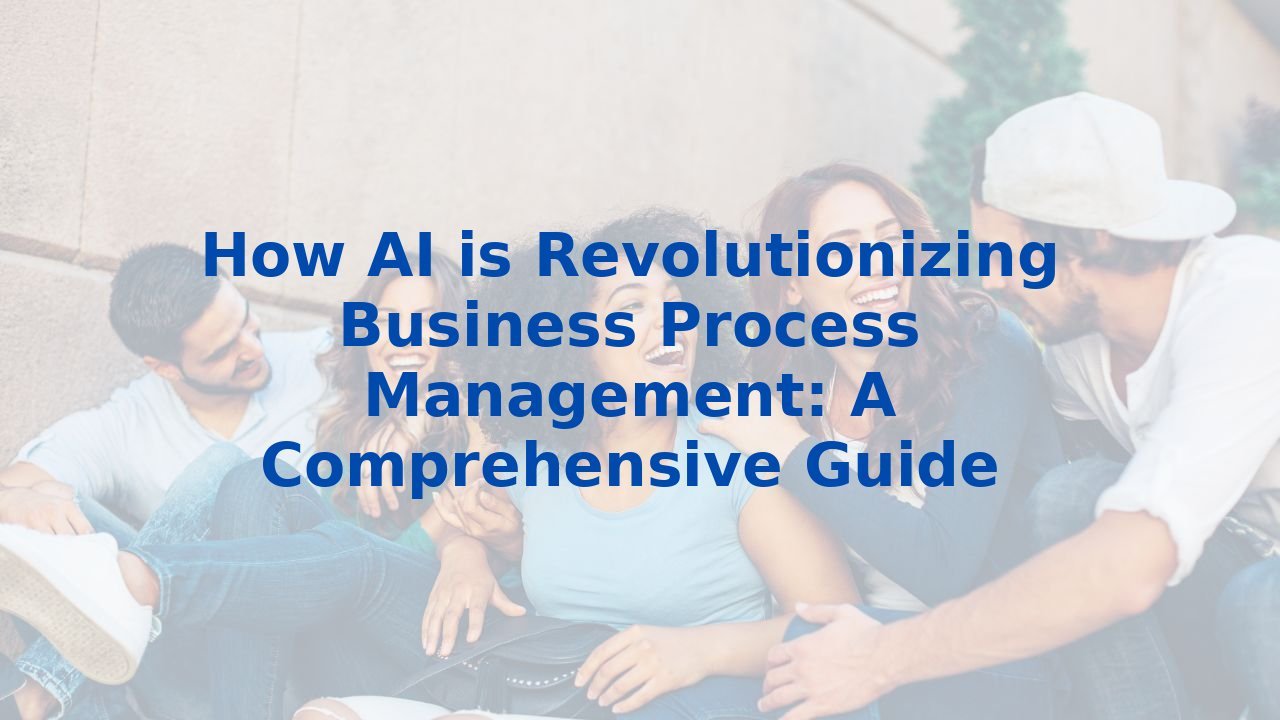How AI is Revolutionizing Business Process Management: A Comprehensive Guide
How AI is Revolutionizing Business Process Management: A Comprehensive Guide
Introduction
The landscape of business process management (BPM) has long been a vital component in ensuring organizational efficiency. However, as artificial intelligence (AI) emerges as a transformative force, BPM is experiencing a paradigm shift. This exploration delves into how AI enhances business processes, underscoring its benefits for driving efficiency within organizations. Moreover, we’ll emphasize the significance of employee training in leveraging AI's full potential.
The Evolution of Business Process Management
Born out of necessity in the late 1980s, BPM has evolved into a strategic tool aimed at refining efficiency, productivity, and the overall quality of operations. Traditionally, BPM relied on manual mapping and analysis, which often resulted in bottlenecks due to time-consuming processes and human errors.
How AI is Transforming BPM
Enter AI—its ability to automate and analyze has become a game-changer for BPM. Below are key ways in which AI is revolutionizing business processes:
Process Simulation and Analysis
AI empowers organizations through process simulation. By analyzing past data, machine learning algorithms unveil patterns, enabling companies to construct simulation models. This capability gives organizations the ability to test multiple scenarios, assess key performance indicators (KPIs), and pinpoint inefficiencies before they escalate.
Process Mining
Through AI-driven process mining, companies gain insights in real-time by examining log data from various systems. This helps in visualizing process flows and detecting divergences from established procedures, translating to timely issue identification and resolution.
Automation of Repetitive Tasks
AI significantly reduces the burden of manual tasks. By automating rule-based workflows—such as processing vacation requests, invoices, or employee onboarding—AI liberates personnel to tackle more complex, fulfilling responsibilities that require human creativity and critical thinking.
Enhancing Decision-Making
AI plays a vital role in decision-making by gathering and processing extensive datasets from both internal and external sources. By simulating different scenarios and suggesting optimal paths, AI equips decision-makers with invaluable insights, enhancing the accuracy and efficacy of their choices.
Real-Time Assistance and Customer Service
Customer interactions are another area where AI shines. Implementing chatbots and virtual assistants allows businesses to efficiently handle inquiries and streamline customer service processes. By analyzing customer sentiment and feedback, AI effectively predicts behaviors and churn, facilitating proactive engagement strategies.
Benefits of AI in BPM
Incorporating AI into BPM comes with a plethora of advantages:
- Improved Efficiency: By automating time-consuming tasks, AI allows employees to dedicate more time to valuable work, ultimately enhancing productivity.
- Enhanced Decision-Making: AI-driven insights foster well-informed choices that can propel organizational success.
- Increased Accuracy: The automation of repetitive tasks minimizes human error, boosting overall accuracy in operations.
- Real-Time Monitoring: With the capability to immediately alert decision-makers of process anomalies, AI facilitates swift interventions to mitigate risks.
The Role of Training in AI Adoption
The introduction of AI into BPM is promising; however, without proper training, its impact can be limited. Investing in employee training is crucial for maximizing these advanced technologies. Here’s how:
- Skill Enhancement: Training equips employees to effectively navigate AI tools, enhancing their productivity and performance.
- Adoption and Integration: Well-informed employees seamlessly incorporate AI into their workflows, leading to increased operational effectiveness.
- Problem-Solving: Trained staff can swiftly tackle any challenges that arise during the transition to AI, ensuring smoother implementation and ongoing efficiency.
Conclusion
A seamless integration of AI into business process management is fundamentally changing the way organizations operate. Automating tedious tasks, bolstering decision-making, and providing real-time insights contribute significantly to operational improvements. Moreover, fostering a culture of continuous learning through training ensures that employees are equipped to harness AI's transformative power. As organizations adapt to this new landscape, embracing AI isn't merely advantageous—it's imperative for maintaining excellence and competitive edge.
The future of BPM is undeniably intertwined with AI; businesses that prepare for this evolution by investing in both technology and their workforce will be best positioned for success.



